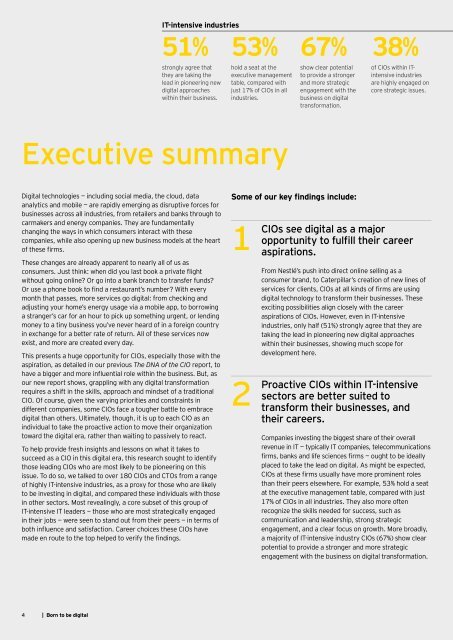EY-CIOs-Born-to-be-digital
EY-CIOs-Born-to-be-digital
EY-CIOs-Born-to-be-digital
You also want an ePaper? Increase the reach of your titles
YUMPU automatically turns print PDFs into web optimized ePapers that Google loves.
IT-intensive industries51% 53% 67% 38%strongly agree thatthey are taking thelead in pioneering new<strong>digital</strong> approacheswithin their business.hold a seat at theexecutive managementtable, compared withjust 17% of <strong>CIOs</strong> in allindustries.show clear potential<strong>to</strong> provide a strongerand more strategicengagement with thebusiness on <strong>digital</strong>transformation.of <strong>CIOs</strong> within ITintensiveindustriesare highly engaged oncore strategic issues.Executive summaryDigital technologies — including social media, the cloud, dataanalytics and mobile — are rapidly emerging as disruptive forces forbusinesses across all industries, from retailers and banks through <strong>to</strong>carmakers and energy companies. They are fundamentallychanging the ways in which consumers interact with thesecompanies, while also opening up new business models at the hear<strong>to</strong>f these firms.These changes are already apparent <strong>to</strong> nearly all of us asconsumers. Just think: when did you last book a private flightwithout going online? Or go in<strong>to</strong> a bank branch <strong>to</strong> transfer funds?Or use a phone book <strong>to</strong> find a restaurant’s num<strong>be</strong>r? With everymonth that passes, more services go <strong>digital</strong>: from checking andadjusting your home’s energy usage via a mobile app, <strong>to</strong> borrowinga stranger’s car for an hour <strong>to</strong> pick up something urgent, or lendingmoney <strong>to</strong> a tiny business you’ve never heard of in a foreign countryin exchange for a <strong>be</strong>tter rate of return. All of these services nowexist, and more are created every day.This presents a huge opportunity for <strong>CIOs</strong>, especially those with theaspiration, as detailed in our previous The DNA of the CIO report, <strong>to</strong>have a bigger and more influential role within the business. But, asour new report shows, grappling with any <strong>digital</strong> transformationrequires a shift in the skills, approach and mindset of a traditionalCIO. Of course, given the varying priorities and constraints indifferent companies, some <strong>CIOs</strong> face a <strong>to</strong>ugher battle <strong>to</strong> embrace<strong>digital</strong> than others. Ultimately, though, it is up <strong>to</strong> each CIO as anindividual <strong>to</strong> take the proactive action <strong>to</strong> move their organization<strong>to</strong>ward the <strong>digital</strong> era, rather than waiting <strong>to</strong> passively <strong>to</strong> react.To help provide fresh insights and lessons on what it takes <strong>to</strong>succeed as a CIO in this <strong>digital</strong> era, this research sought <strong>to</strong> identifythose leading <strong>CIOs</strong> who are most likely <strong>to</strong> <strong>be</strong> pioneering on thisissue. To do so, we talked <strong>to</strong> over 180 <strong>CIOs</strong> and CTOs from a rangeof highly IT-intensive industries, as a proxy for those who are likely<strong>to</strong> <strong>be</strong> investing in <strong>digital</strong>, and compared these individuals with thosein other sec<strong>to</strong>rs. Most revealingly, a core subset of this group ofIT-intensive IT leaders — those who are most strategically engagedin their jobs — were seen <strong>to</strong> stand out from their peers — in terms ofboth influence and satisfaction. Career choices these <strong>CIOs</strong> havemade en route <strong>to</strong> the <strong>to</strong>p helped <strong>to</strong> verify the findings.Some of our key findings include:1<strong>CIOs</strong>2Proactivesee <strong>digital</strong> as a majoropportunity <strong>to</strong> fulfill their careeraspirations.From Nestlé’s push in<strong>to</strong> direct online selling as aconsumer brand, <strong>to</strong> Caterpillar’s creation of new lines ofservices for clients, <strong>CIOs</strong> at all kinds of firms are using<strong>digital</strong> technology <strong>to</strong> transform their businesses. Theseexciting possibilities align closely with the careeraspirations of <strong>CIOs</strong>. However, even in IT-intensiveindustries, only half (51%) strongly agree that they aretaking the lead in pioneering new <strong>digital</strong> approacheswithin their businesses, showing much scope fordevelopment here.<strong>CIOs</strong> within IT-intensivesec<strong>to</strong>rs are <strong>be</strong>tter suited <strong>to</strong>transform their businesses, andtheir careers.Companies investing the biggest share of their overallrevenue in IT — typically IT companies, telecommunicationsfirms, banks and life sciences firms — ought <strong>to</strong> <strong>be</strong> ideallyplaced <strong>to</strong> take the lead on <strong>digital</strong>. As might <strong>be</strong> expected,<strong>CIOs</strong> at these firms usually have more prominent rolesthan their peers elsewhere. For example, 53% hold a seatat the executive management table, compared with just17% of <strong>CIOs</strong> in all industries. They also more oftenrecognize the skills needed for success, such ascommunication and leadership, strong strategicengagement, and a clear focus on growth. More broadly,a majority of IT-intensive industry <strong>CIOs</strong> (67%) show clearpotential <strong>to</strong> provide a stronger and more strategicengagement with the business on <strong>digital</strong> transformation.4 | <strong>Born</strong> <strong>to</strong> <strong>be</strong> <strong>digital</strong>


